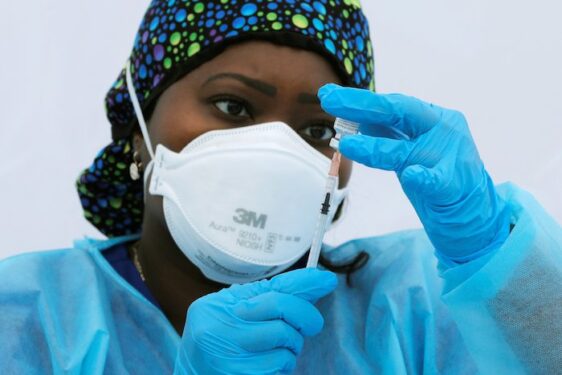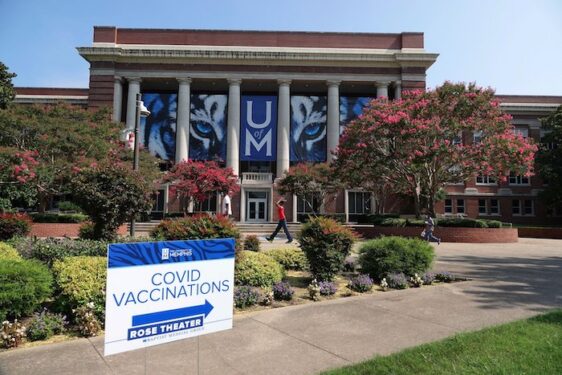NEW YORK — As bishops nationwide weigh COVID-19 vaccination mandates and religious exemptions, the Diocese of El Paso has taken the step of imposing its own COVID-19 vaccination mandate for diocesan employees.

Bishop Mark Seitz of El Paso announced the decision earlier this week. He told The Tablet the decision boiled down to a responsibility to keep people safe and a need to lead by example in showing the importance of getting vaccinated.
The decision comes at a time when dioceses across the country are responding differently to COVID-19 vaccination mandates by federal, state, and local entities, and questions from the faithful of whether or not they can seek religious exemptions from such orders.
Bishop Seitz explained each person has the right to refuse the vaccine, however, that doesn’t mean there can’t be consequences to that decision if it means keeping people safe.
“People are welcome to choose not to get the vaccine for the reason that they feel they need to make a heroic stand to call attention to the fact that some means that we in the church did not consider moral were used in the testing of the vaccines, and in the case of Johnson and Johnson in the development,” Bishop Seitz said. “But when a person takes a heroic stand there are also consequences to that stand based on the situation.”
“[The mandate] is a step that I feel I need to take not as a punishment, but as a step necessary for the sake of the safety of yourself and others,” he continued.
Questions around the ethics of getting a COVID-19 vaccine have to do with their connection to abortion-derived cell lines. The Pfizer and Moderna vaccines used the abortion-derived cell lines in testing, while the Johnson & Johnson vaccine was developed, produced, and tested with the abortion-derived cell lines.
South Dakota Bishops Donald DeGrood of Sioux Falls and Peter Muhich of Rapid City published a joint statement on Aug. 10 stating that the decision to get vaccinated should be voluntary as stated by the Vatican. And that they “support any Catholic who has come to this conviction in seeking religious exemption from any COVID-19 requirement.”
The four prelates of Colorado — Archbishop Samuel Aquila and Auxiliary Bishop Jorge Rodríguez of Denver, Bishop James Golka of Colorado Springs, and Bishop Stephen Berg of Pueblo — published a similar statement on Aug. 6 against COVID-19 vaccination mandates. It was embedded with a religious exemption template letter for parishioners to use.
“Being the Catholic Church, we have to respect the right of conscience and in the possibility, some coercion or force might be used we wanted to reassure individual Catholics that there was a vehicle by which they could request a right, which was given to them by the state,” Bishop Berg explained to The Tablet earlier this week.
However, the Archdiocese of New York and the Dioceses of Brooklyn and San Diego have each sent out guidance to the clergy that they can’t give parishioners religious exemptions to COVID-19 vaccination mandates.

In a letter to diocesan priests on Aug. 11, Bishop Robert McElroy of San Diego to “caringly decline such requests from your parishioners to sign the Colorado, or other, public declarations concerning the actions of specific individuals rejecting vaccine mandates on religious grounds.”
A July 30 memo to clergy from the Diocese of Brooklyn’s Office of the Vicar General stated that there is “no religious exemption for Catholics as the Vatican has determined that the COVID-19 vaccines are morally acceptable.”
An Archdiocese of New York memo on the same day told priests not to get involved with religious exemptions from COVID-19 vaccination mandates because it would be “acting in contradiction to the directives of the pope,” adding that “there is no basis for a priest to issue a religious exemption to the vaccine.”
The Vatican’s Congregation for the Doctrine of the Faith, on December 21, 2020, published guidance that the COVID-19 vaccines are morally acceptable. Although, in the same guidance the CDF wrote that vaccination is not a moral obligation, and therefore “it must be voluntary.”
Pope Francis later suggested to an Italian news station in January that there is a moral obligation for everyone to get vaccinated. Nonetheless, based on the guidance from the CDF those dioceses allowing and barring the religious exemptions are correct in their reasoning.
Considering the mixed decisions by Church leaders, Bishop Seitz told The Tablet it comes down to “what we mean by religious exemption.”
“An individual may choose not to get the vaccine for religious reasons. That is certainly true,” Bishop Seitz said. “But if by religious exemption we mean that a person may choose not to get the vaccine and for it not to have any impact on that person’s presence working for the church, serving the church, working at their job, going to school, that’s a whole other question because it has an impact on public health.”
The bishop added that reaction to his decision in the diocese has been “amazingly quiet.”
The United States Conference of Catholic Bishops declined The Tablet’s request for comment on whether it would issue any sort of nationwide guidance on COVID-19 vaccination mandates and religious exemptions.
